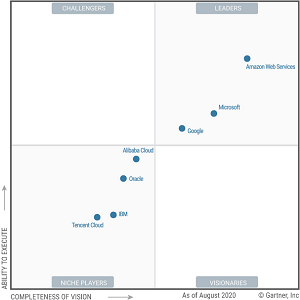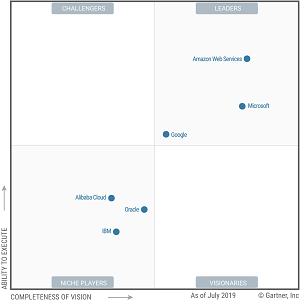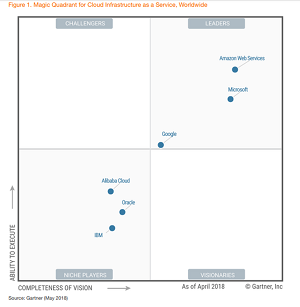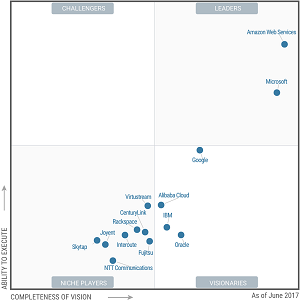News
Cloud Research Report Addresses 'Hard Questions' Caused by COVID-19
Like it has for years, Gartner's Magic Quadrant report on cloud computing platforms lists the same three vendors at the top -- AWS, Microsoft and Google -- but there is one new factor in the mix: COVID-19.
"The global spread of COVID-19, the novel coronavirus, has driven organizations to rethink the ways they work and operate," the 2020 "Magic Quadrant for Cloud Infrastructure and Platform Services" report says. "Many employees have been told to work from home and to use videoconferencing and online collaboration services. Not only does this stress the limits of back-end supporting services, which in many cases are cloud services, but it significantly increases the volume of traffic in the networks connecting users to their services."
With many enterprises wondering if their business continuity strategies are up to par under the new stresses, Gartner said: "Some hard questions related to the use of cloud services in situations like this are being asked, including:
- Is the public cloud model sufficiently scalable and resilient to handle unforeseen spikes in demand?
- Do public cloud providers maintain excess capacity to rapidly deploy new services when needed?
- Are supporting infrastructure requirements sufficiently robust to ensure continued access to public cloud services?
- Can a public cloud service continue to deliver services when support personnel are affected by illness?
- Is the telecommunications and networking infrastructure prepared to handle the increase in traffic volume as organizations leverage the internet to access services?
- Are there any concerns around the security (physical, perimeter, customer data, etc.) of cloud data centers as the workforce performing those functions are being asked to work from home?
Along with the emergence of COVID-19 as a factor, the report also evolved in another way, moving from a focus on "infrastructure-as-a-service" (IaaS) to "cloud infrastructure and platform services" (CIPS).
The definition of CIPS is: "standardized, highly automated offerings, in which infrastructure resources (e.g., compute, networking and storage) are complemented by integrated platform services."
Other than that, AWS, Microsoft and Google continue to mostly dominate the world outside of China and surrounding Asian countries, where Alibaba Cloud is listed as one of the top four hyperscale providers.
The report is available in a "licensed for distribution" form from at least two of the top three providers, upon filling out registration information.
Below are the charts for the last several years:
 [Click on image for larger view.] Gartner 2020 Magic Quadrant for Cloud Infrastructure and Platform Services (source: Gartner).
[Click on image for larger view.] Gartner 2020 Magic Quadrant for Cloud Infrastructure and Platform Services (source: Gartner).
 [Click on image for larger view.]
Gartner 2019 IaaS Magic Quadrant (source: Gartner)
[Click on image for larger view.]
Gartner 2019 IaaS Magic Quadrant (source: Gartner)
 [Click on image for larger view.]
Gartner 2018 IaaS Magic Quadrant (source: Gartner)
[Click on image for larger view.]
Gartner 2018 IaaS Magic Quadrant (source: Gartner)
 [Click on image for larger view.]
Gartner 2017 IaaS Magic Quadrant (source: Gartner)
[Click on image for larger view.]
Gartner 2017 IaaS Magic Quadrant (source: Gartner)
"Most enterprises have adopted CIPS strategically, and have a broad range of workloads on IaaS and PaaS, including production applications," Gartner said in its 2020 market overview. "Midmarket businesses are the most likely to believe that cloud services, such as IaaS, will replace nearly all their data center infrastructures during the next five years. Late-adopter enterprises that have not yet piloted CIPS begin with new applications.
"Both public multitenant and private single-tenant offerings are available; however, the distinction between public and private cloud IaaS is blurring, as CIPS providers extend their regions into enterprise data centers and edge locations. Gartner is beginning to describe the broader picture of public cloud services existing in different physical locations as 'distributed cloud.' "
About the Author
David Ramel is an editor and writer at Converge 360.